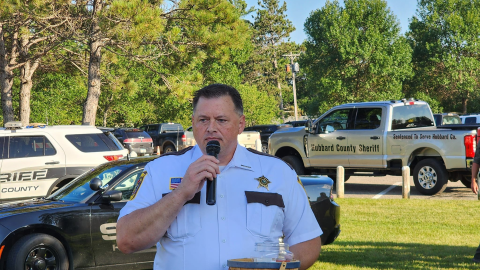DULUTH — It's that time of year, when a strong winter storm might produce giant waves along Lake Superior shorelines that aren't frozen over.
Minnesota researchers are looking at how to harness those forces and turn them into usable energy. Superior's waves can sometimes top out at 10 to 15 feet in height before crashing into the shore.
University of Minnesota Duluth Assistant Professor of Mechanical and Industrial Engineering Craig Hill and his team have been looking into wave pattern data to learn just how powerful they can be.
Additional work will focus on deploying efficient devices that can convert wave energy into storable electrical energy. Hill said the Great Lakes region is a good "testing lab."
"We occasionally get these big storms," said Hill, "where we could, if the technologies were out there, we could power tens of thousands of homes from the waves in those storms."
Hill said one challenge is that Great Lakes waves are more intermittent compared to coastal areas on either side of the U.S.
He said those regions are seeing acceleration of this type of work, but noted that Superior can still be an ally in the movement, especially for testing.
He added that if the technology is perfected, waves could be one of many sources used in the transition away from fossil fuels.
Climate change is resulting in less ice cover on Lake Superior. Hill suggested that they can take that unfortunate impact and turn it into an opportunity.
"That has a big impact on the wave conditions," said Hill. "That has a big impact on the coastlines around the Great Lakes. And so, there might be opportunities to test out the devices year-round in the coming future here, on Lake Superior."
Hill said securing enough research funding is another challenge.
And before this technology is turned into a commercial-scale option, experts will have to ensure fish, aquatic mammals and shorelines aren't negativity impacted.
-
It's the Warriors' third consecutive high kick title and their first jazz title in school history.
-
Events this week include an emerging artist showcase in Bemidji and Stage North Theater's production of "Forbidden Broadway" in Brainerd.
-
-
As some area lakes boast nearly 3 feet of ice during the deep freeze of winter, drivers compete week after week on a frozen racetrack in Laporte.
-
The cause of the Feb. 18, 2026, fire is under investigation, and the names of those impacted have not been released.
-
Plus: Sheriffs in Hubbard, Lake and Polk counties announce retirement plans; Minnesotans take advantage of deep freeze with lake ice racing; and Northland girl hockey players are so far 1-1 in the state tournament.
-
The Valentine’s Day Iron Range Barn Dance united a crowd of all ages and skill levels for an evening of community dancing in Bovey.
-
A measure in the Minnesota Legislature would give recently laid-off miners on the Iron Range the same extra 26 weeks of benefits that miners laid off last year received.
-
KAXE's weekly list of concerts near you features Skarlett Woods, Cameron Elijah Erickson, Singer-Songwriter Showcase and J Streitz.
-
Hubbard County Sheriff Cory Aukes announced Feb. 11, 2026, that he would seek the District 3 Commissioner seat instead of a fifth term as sheriff.













